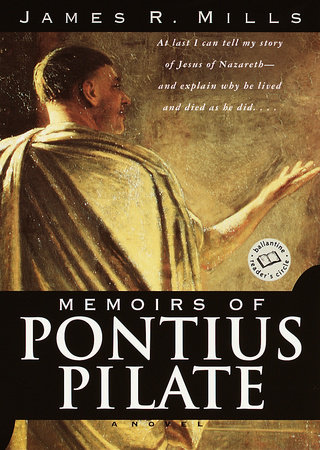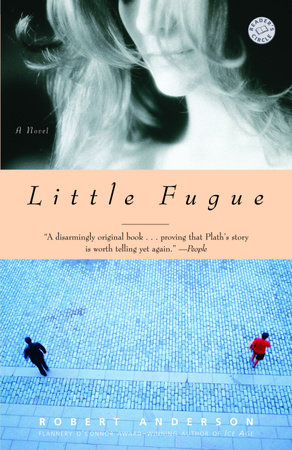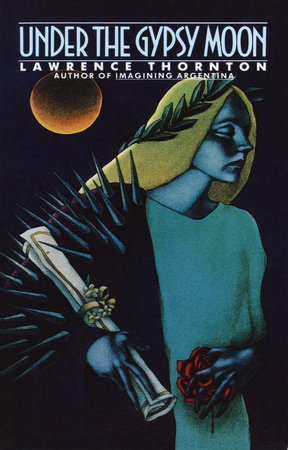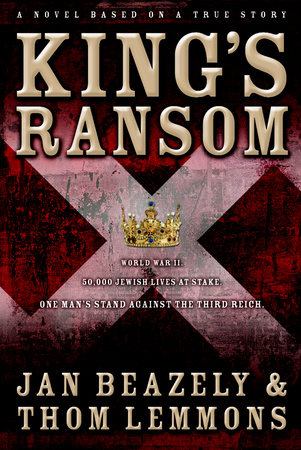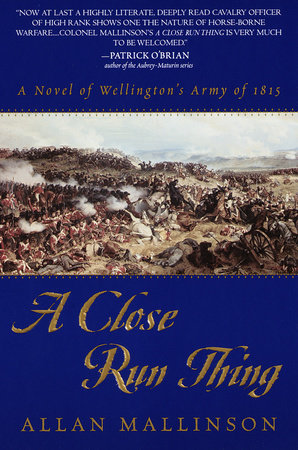Author Q&A
A Conversation with James Mills Question: Explain the genesis of
Memoirs of Pontius Pilate.
James Mills: Some time ago, the pastor of my church said in a Sunday
morning sermon it’s a great pity that we don’t have a life of Christ
written by one of his enemies. He said we know what his followers
thought of him; we have the Gospels, four accounts from men who were
totally committed to him, but it’s a one-sided view. What would an
account from one of his enemies look like? What could we learn from
that?
The questions interested me. We know a lot about Pilate from ancient
sources. The Bible characterizes him quite well, though in relatively
few words. We also have the writings of Josephus, and we have further
information from Philo of Alexandria. They all make him out to be the
same kind of person: a professional politician, one who was very cynical
and whose principles were, well, flexible. I was thinking on that
morning that I know this person, and that it would be possible to
compose a life of Christ from the perspective of Pontius Pilate.
Q: What in your experience made such a character familiar to you?
JM: Twenty-two years in the California legislature, ten of which I
spent as president pro tempore of the California Senate. I was a career
politician. I have seen people like Pilate on all levels of government;
people who are pragmatic and don’t let what is right or wrong get in the
way of what they’re doing–and what they’re doing is surviving. Pilate
was in a difficult situation: his protector, Sejanus, had been thrown
off the Tarpeian Rock with his wife and children, and the enemies of
Sejanus were looking to dispose of Pilate as well.
Pilate demonstrated a common failing of many politicians: overlooking
justice to save himself. He determined that this carpenter from Nazareth
was not guilty of the crime that he was charged with, and yet decided to
execute him. His decision was made to gain the favor of those whose
support was important to him, namely, the Sadducees, a small but
influential minority of the Jewish population at that time who were
convinced that Christ was a danger, particularly after his raising of
Lazarus.
Following that event, the high priest, Joseph ben Caiaphas, said it is
better that this man should lose his life than that we should lose our
place as a nation. That was important to them, and they were important
to Pilate because they were the only supporters the Romans had in the
Holy Land. The Sadducees were the only ones really interested in trying
to live with the Romans as their conquerors. One of the issues I tried
to raise in the book was not only the motivation for Pilate, but the
motivation for the Sadducees for pursuing this carpenter to death.
Q: Untangling the knot of religion and politics at the heart of
Christ’s historical moment seems to be a chief concern in Memoirs of
Pontius Pilate.
JM: Very much so. The average Christian and the average Jew know very
little about the time and place in history in which Christ appeared. I
thought the book would be an effective way to convey an understanding of
what was going on in Palestine at that time. To understand the life of
Christ, we need to understand the conflicts between the Pharisees and
the Sadducees, and, earlier, the Jews and the Greeks who had been
settled in that land by Alexander the Great. These conflicts shed light
on the nature of the relationship between the Jewish subjects and the
Roman rulers, factors that had a bearing on Pilate’s decision.
It’s interesting to me that Christians know so little about the scene
within which Christ’s life was lived, and that Jews know so little about
the scene within which Jewish orthodoxy was developed. Jewish orthodoxy
was really being formulated at that time by the Pharisees. I thought all
of those things would be very useful to people in understanding the life
of Christ. You can’t really understand somebody’s life if you don’t
understand the scene upon which it was played out.
Q: How did you go about creating a voice for Pilate?
JM: I started with the knowledge that we have of Pilate, the
recurring description of him as a cynical, pragmatic politician. So I
thought the appropriate thing was to present him that way. His voice is
that of a man who is there to make some money, a man not above taking a
bribe, which was something you could do often as the governor of a Roman
province.
The actual language that I employed was a Latin form of English; that is
to say that I tried to create a voice that was like the great Roman
writers of prose, particularly Julius Caesar and Cicero. I wrote
relatively simple sentences of the kind for which they were famous. I
tried for a consistency but did not want to carry that too far. There
were times when I thought a person like Pilate might become slightly
lyrical.
Q: What about selecting a genre? You call Memoirs of Pontius Pilate a
novel. Where do fact and fiction meet?
JM: The book is fiction only in the sense that the voices of Pilate,
Herod, and others are fictionalized, but nothing else is. Everything in
this book is derived from the Bible or from accepted history or ancient
traditions.
The four Gospels provide the foundation of this book. I do not question
the validity of anything in them. There are theologians involved in
higher criticism and lower criticism who analyze the Gospels to
determine which parts are true and which aren’t. I am not one of them: I
accept the gospels in their entirety as true as a first premise for the
book.
Q: What other than the Gospels did you accept as authoritative
sources?
JM: The ancient tradition that has Pilate committing suicide was
mentioned by Origen, an early church authority. The story which tells of
Pilate walking into the Rhone River and drowning himself is very old,
and I accepted it. People have been intrigued for centuries with the
question of why Pilate took his life. Christians have been asking
themselves did he do it because he realized what he had done, that he
had killed the son of God. I don’t make any assumptions in that regard.
I tried to make my book as factual as I could, and not to include
various people’s speculation.
Q: We don’t get a real wrestling with conscience, the proverbial dark
night of the soul, in your depiction of Pilate looking back.
JM: I don’t think a cynical, pragmatic politician is likely to suffer
through that much soul-searching. I presented him as only moderately
troubled by what he had done. He had brought about the death of a person
unjustly; he regretted that, but it wasn’t the kind of thing that was
going to keep him awake nights. And he remains unconvinced from
beginning to end about the identity of the victim. Pilate entertains the
possibility that Christ was the messiah, but leaves the question open
for future generations to discover.
Q: What has the experience of writing Memoirs of Pontius Pilate meant
to you?
JM: It was very satisfying to me to pull together so many ideas that
I have thought throughout the course of years. The book was the
culmination of a lifetime of reflections, some going back to things that
I thought listening to sermons thirty or forty years ago.
What’s more important, writing the book made me understand the events in
Christ’s life better, and I’m happy to say that many readers have had a
similar experience. They say that one of the great things about the book
is that it enables them to understand the Gospels better; they find all
of the four much more meaningful now that they have a feeling for what
took place. That means a lot to me, for I was trying to provide the
information for today’s reader that the original readers had.
Q: Toward that end, you devote significant attention to Herod the
Great.
JM: One thing I thought would be interesting to Christian readers and
to Jewish readers was the information that I presented about Herod the
Great, whose reign contributed greatly to setting the scene for the life
of Christ. I think the reign of Herod the Great is very important in
creating the situation into which Christ was born and in which he grew
up. Another thing that I tried to accomplish was to close the gap
between the Old Testament and the New Testament, particularly the one
that exists in the Protestant Bible. I wanted for a lot of readers to
connect both books by filling in that historic gap. There again is
information you need to know to make sense of the life and death of
Christ.
Q: With presidential candidates citing Jesus Christ as a role model,
your work appears both timely and timeless, that is, an apt
consideration of the uneasy intersection of religion and politics.
JM: When I hear a politician publicly discussing religion I ask, is
this person really laying bear his spirit, or is he saying something he
believes a lot of voters would like to hear? I don’t like to hear about
religion from the individual in a public forum. If somebody else wants
to say this person is a committed Christian or that religion really
matters to him, fine. People should prefer to have politicians show
their Christianity rather than talk about it.
Q: How often did you ask yourself what you would do in Pilate’s
predicament while writing the book?
JM: What would I do if I were in Pilate’s position, where my tenure
in the office if not my life could be imperiled by my decision to do the
right thing. That’s one question, and one that none of us could answer
unless we faced it.
The more important question is this: Would today’s Christians have
followed Christ during his time? Would they have been committed to Him?
The chances are that a very large percentage of them would not. If
religious conservatives today were conservative then, they would not
have followed Christ, a radical. Christ would have been unnerving to a
lot of people who go to church every Sunday and look upon themselves as
orthodox, faithful Christians.
Christians today should wonder if they would have followed Christ.
Q: What’s next?
JM: I’m working on another book now; it’s completely different: it’s
fiction and contemporary.
Q: Yet isn’t Pilate’s story utterly contemporary?
JM: I’ve said to various people on various occasions, look, Pontius
Pilate is alive and well today. Pontius Pilate is on every city council
and state legislature that I have ever seen. He is in California and the
United States Congress. In fact, he is present everywhere in politics.
One of the reasons that things don’t turn out right for us is because
there are too many people in decision making positions in politics who
don’t do what they think is right. They do what they think is
politically expedient, which is what Pontius Pilate did.
